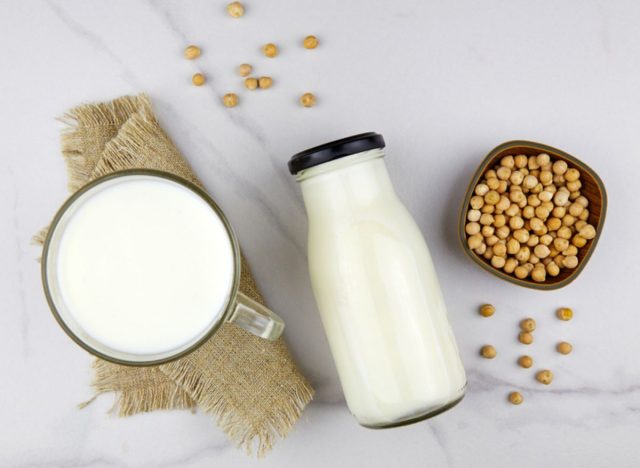This Is the Best Plant-Based Milk, New Study Says

Pouring yourself a cold glass of milk used to mean indulging in dairy. However, these days, there are plenty of other options when it comes to plant-based milk. At the same time, not all alt-milks offer you the same nutrients, which is why a new study took a look at plant-based milk and determined which is the healthiest option.
In the study, which was presented at the American Chemical Society Fall 2022 event, researchers took a look at the mineral content—specifically, magnesium, phosphorus, zinc, and selenium—of various plant-based milk options including almond, cashew, coconut, hemp, oat, rice, pea, and soy, according to EurekAlert! Not only did they find that both pea and soy milk had higher levels of these minerals when compared to cow’s milk, but pea milk actually had 50% higher levels of phosphorus, zinc, and selenium than milk from a cow.
“When it comes to a milk’s vitamin and mineral content, it is important to ensure consumers are adequately replacing what they would otherwise be getting in traditional dairy milk,” says Trista Best, a Registered Dietitian at Balance One Supplements, Environmental Health Specialist, and Adjunct Nutrition Professor. “This study shows that pea milk is an excellent alternative, whereas most consumers think of soy as an ideal dairy milk alternative. It is great that this type of research is being conducted.”

Because the study compared plant-based milk alternatives to cow’s milk, Best puts this into context while considering whether or not cow’s milk is healthier than all the other alt-milks besides pea and soy, saying, “What you are missing in plant milks versus dairy-based milks is minimal, especially when compared to what you are avoiding by drinking plant-based milks. Consumers are avoiding inflammatory dairy and saturated fat, primarily.”
When it comes to the nutrients you would get from cow’s milk as opposed to plant-based milk, Best again notes that “the differences are minimal and you are most likely getting the other vitamins and minerals in other areas of your diet.” That’s why she says, “I’d recommend just selecting the alternative milk that you like the most.”
As for why you might want to start drinking pea milk, Best points out that it “is the newest form of cow’s milk alternative, plant-based milks on the market,” and is “packed with protein, fiber, calcium, and omega fatty acids.” Because of “this nutrient profile,” pea milk is “a serious contender in this realm of health foods.”
Beyond that, Best explains that “one major benefit to opting for pea milk is the risk for allergic reaction from other milk alternatives,” saying “whether it be almond, soy, or even oat milk, each of these has the potential to lead to an allergic response from those who unknowingly have an allergy.” Best adds, “Peas are very low on the allergen potential and may be an ideal option for anyone with a known allergy to the other plant-based milks.”







